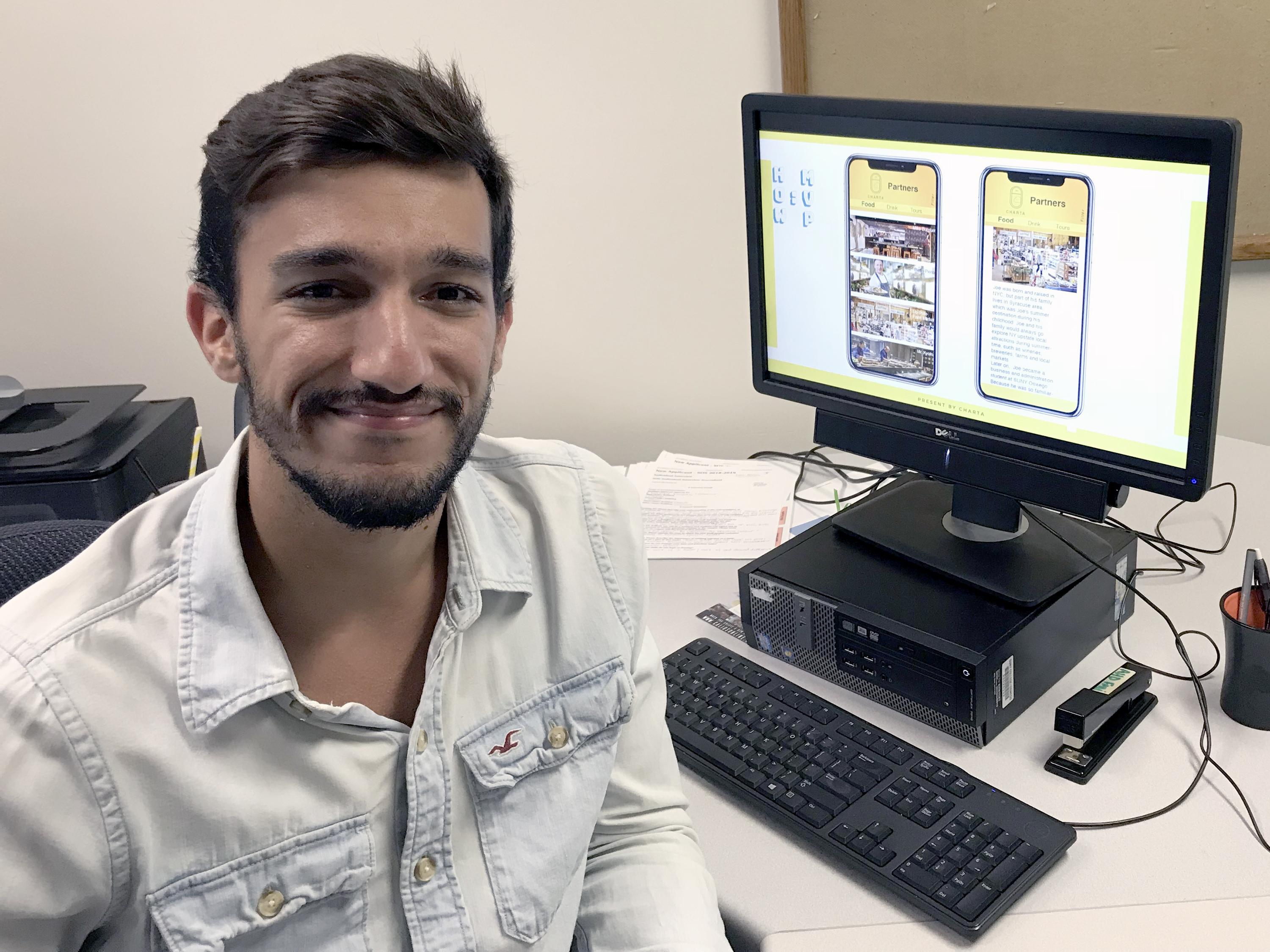Successful start -- Fabio Machado, a graduate student in SUNY Oswego's strategic communication program, recently reached the finals of the Oswego County Next Great Idea competition with Charta, an app that would help younger travelers on a budget gain more authentic experiences.
A SUNY Oswego graduate student’s desire to help travelers have more authentic experiences advanced his team to the final four of the recent Oswego County’s Next Great Idea competition.
And while Fabio Machado’s app in development, called Charta, did not win the contest’s $50,000 first-place prize announced on Sept. 18, he found plenty of value in the experience.
“Making it that far was great validation,” said Machado, who is working on his master’s in strategic communication at Oswego. “It’s the first time Charta has entered a competition.” The experience proved a learning process that also helped him make new connections as plans for his startup continue.
The idea for Charta (Latin for “map”) came to Machado when he was in Barcelona, Spain, over winter break and saw the need for a better guide for younger travelers who don’t have a lot to spend and want a more authentic interaction with the local culture.
“Because I’m a student, I have a low budget,” Machado recalled. “Most of the recommendations I could find were for big, more expensive experiences -- regular tourist places. I wanted to meet the people who lived there, hear their stories, get real local experiences.”
Coming back to Oswego, he learned about the county’s Next Great Idea competition and reached out to two friends from his native Brazil. Carlos Rochael, who still lives there, has a business background, while their technical coordinator, Phelipe Maia, now lives in Poland. But the biggest obstacle to moving Charta forward has not been geography as much as funding and available time, especially since Maia already works full-time as a web developer.
When developed, the app would list local partners, provide offers and coupons and promote local businesses while providing value to visitors using the app.
“If you click on a local restaurant you find interesting, it could offer more information and a coupon to make you more likely to visit,” Machado said. “Supporting local businesses is important to us. They don’t have the budget to compete with the big businesses, but they are much more authentic, and they are big supporters of the local community.”
College foundations
Machado said making it to the competition’s finals would not have been possible without what he has learned so far at Oswego.
“In my first semester, we had to develop a business plan as our final project,” he said. “That helped a lot.” The project helped him learn more about how to conduct a SWOT (strengths, weaknesses, opportunities, threats) analysis for a startup, and laid a foundation for developing the business plan that got them noticed in the competition.
Having outstanding professors has helped as well. “I had classes with Dr. Mary Toale and Dr. Katherine Thweatt, and they are definitely my role models,” he said of two of the founding faculty in the strategic communication program. “They definitely inspire me in so many ways.”
Moving forward
The team’s vision for finding a way to help young adult travelers connect with local customs and cultures, find small businesses of interest and meet local people who can help them navigate a more authentic experience will keep moving forward.
“I’m going to reach out to the people I met during the ceremony,” Machado said, including John Halleron, a senior business adviser from the Small Business Development Center, which is part of the college’s Office of Business and Community Resources. Other college resources, including SUNY Oswego’s School of Business and its upcoming Launch It competition, could also provide avenues toward realizing their dream.
Even with a team that spans the globe, Machado thinks he is in the right place for their start-up to develop.
“We think Upstate New York is a great place to start,” Machado said. Between summer vacationers, fall fishing-related tourism and winter outdoor enthusiasts locally, plus nearby resources spanning the Finger Lakes to the Adirondacks, plenty of opportunity exists.
“We have an idea, and we have a business plan,” Machado explained. “We just need to find that seed capital to start doing it.”




